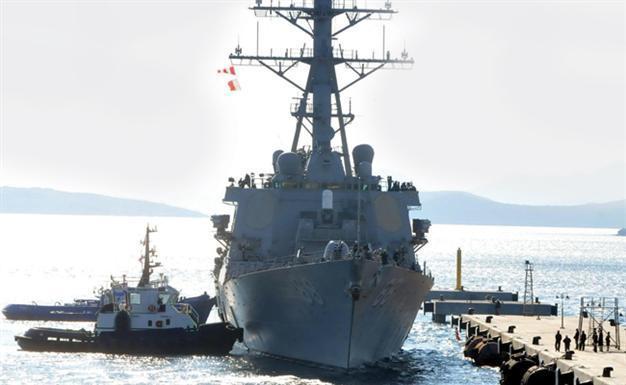US ship docks at Bodrum amid warning
BODRUM / WASHINGTON

A US Navy warship docks at a Turkish port as part of a radar system mission. DHA photo
USS The Sullivans, a U.S. Navy warship that operates in the Indian Ocean and the Mediterranean, anchored at a port in Bodrum on March 2.The ship is described as an Arleigh Burke-class “Aegis” guided missile destroyer. The Aegis Ballistic Missile Defense System is a program developed to provide defense against ballistic missiles.
According to Doğan news agency, the 198-meter-long warship, which has a personnel total of 296, dropped anchor at around 4 p.m.
The development comes days after 50 U.S. soldiers were sent to the radar base in the eastern province of Malatya. Turkish press reports earlier this week said NATO’s flag had started to fly at the Erhaç base, which has become a crucial component of the alliance’s anti-missile shield system.
This is the first time that The Sullivans has docked at a Turkish port. It will leave Bodrum early March 5.
U.S. President Barack Obama warned a premature attack on Iran would allow it to play the “victim” in the nuclear crisis, in remarks published March 2 days before his scheduled meeting with Israeli leader Benjamin Netanyahu.
The president told the Atlantic Monthly magazine he would not advertise any United States plans for Iran. At the same time, Obama has consistently refused to renounce a military option. Obama plans to meet March 5 at the White House with Israeli Prime Minister Benjamin Netanyahu and will try to convince him to postpone any plans his government may have to attack Iran’s nuclear facilities in the coming months.
“I think that the Israeli government recognizes that, as president of the United States, I don’t bluff,” he said in the interview. “I also don’t, as a matter of sound policy, go around advertising exactly what our intentions are. But [both] governments recognize that when the United States says it is unacceptable for Iran to have a nuclear weapon, we mean what we say.”
Obama warned that a premature strike might inadvertently help Iran: “At a time when there is not a lot of sympathy for Iran and its only real ally [Syria] is on the ropes, do we want a distraction in which suddenly Iran can portray itself as a victim?” Obama also rejected as unreasonable a more limited policy of containment in confronting Iran’s nuclear efforts.
“You’re talking about the most volatile region in the world,” he said. “It will not be tolerable to a number of states in that region for Iran to have a nuclear weapon and them not to have a nuclear weapon. Iran is known to sponsor terrorist organizations, so the threat of proliferation becomes that much more severe.” He also pointed to economic turmoil in Iran and reiterated that sanctions against the Iranian regime were starting to bite.
In a series of recent meetings with Israeli leaders, administration officials are believed to have sought to persuade Israel to give sanctions more time to work and to hold off on any military strike.
















